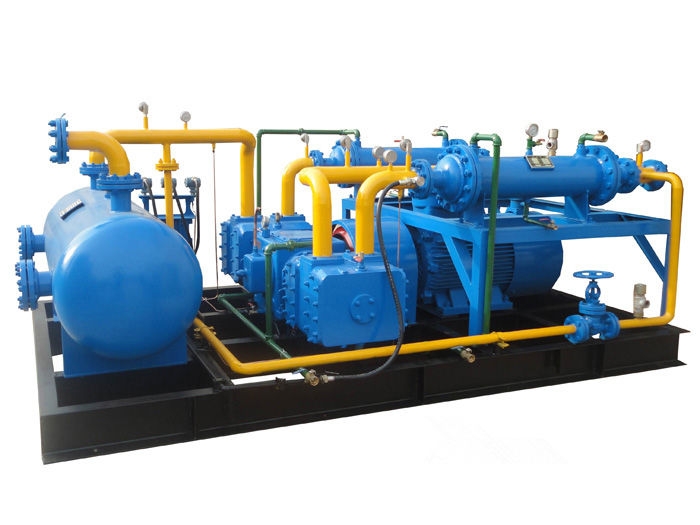Custom Synthesis Gas Compressors: Unlocking the Potential of Tailored Solutions
Customization is pivotal in maximizing the performance and efficiency of industrial utilization – particularly with regard to the manufacture of synthesis gas compressors. In this blog, we will explore the world of custom synthesis gas compressors, focusing on the engineering and manufacturing aspects. We will also delve into the capabilities of Huayan, a leading manufacturer in this field, and how they have revolutionized the industry with their innovative approach.
Understanding Synthesis Gas Compression: What’s Synthesis Gas Compressor?
Synthesis gas, commonly known as syngas, is a mixture of hydrogen, carbon monoxide, and other gases that serves as a crucial intermediate in various industrial processes. The compression of syngas is essential for applications such as ammonia production, methanol synthesis, and Fischer-Tropsch synthesis. However, each of these processes comes with unique requirements, making customization vital to achieving optimal results.
1. Meeting Process-Specific Requirements:
Each industrial process utilizing syngas has specific requirements for compression, including pressure, temperature, gas composition, and flow rate. Customization allows for the design and manufacturing of synthesis gas compressors tailored to meet these unique needs. By fine-tuning the compressor’s characteristics, such as materials, sealing mechanisms, and control systems, optimal efficiency and performance can be achieved.
2. Enhancing Process Efficiency:
Customized synthesis gas compressors help maximize process efficiency by precisely matching the compression requirements. By optimizing the compression process, energy consumption can be minimized, resulting in cost savings and reduced environmental impact. Additionally, customized compressors can improve the overall system reliability, reducing downtime and maintenance costs.
Design Considerations for Custom Synthesis Gas Compressors: Synthesis Gas Compressor
When it comes to customizing synthesis gas compressors, several key factors come into play. First and foremost is the choice of materials. The compressor must be constructed using materials capable of withstanding the corrosive nature of syngas. Additionally, the compressor’s design should account for the specific pressure and flow rate requirements of the intended application.
1. Choosing Corrosion-Resistant Materials:
One of the primary challenges in designing custom synthesis gas compressors is the corrosive nature of syngas. Syngas, a mixture of carbon monoxide, hydrogen, and other gases, can cause accelerated degradation of compressor components if not properly addressed. Therefore, selecting corrosion-resistant materials is crucial for ensuring the long-term durability and performance of the compressor.
Common materials used for synthesis gas compressors include stainless steel, nickel alloys, and special corrosion-resistant coatings. Stainless steel is widely used due to its excellent resistance to corrosion and high-temperature capabilities. Nickel alloys, such as Inconel, offer superior strength and resistance to both oxidation and corrosion, making them suitable for harsh environments. Furthermore, applying specialized coatings, such as ceramics or polymers, can provide an additional layer of protection against corrosion.
2. Meeting Pressure and Flow Rate Requirements:
Custom synthesis gas compressors must be designed to meet specific pressure and flow rate requirements of the application. The pressure rating of the compressor should be carefully selected to ensure it can handle the operating conditions without compromising safety or performance. Moreover, the flow rate capacity of the compressor needs to be matched to the process demands to maintain efficient operation.

To achieve the desired pressure and flow rate, various compressor configurations can be employed. Reciprocating compressors, centrifugal compressors, and rotary screw compressors are commonly used in synthesis gas applications. Each type has its advantages and limitations, and the selection depends on factors such as pressure ratio, flow rate, and desired efficiency.
Case Studies: Success Stories in Customization:
Huayan, a prominent manufacturer in the field of synthesis gas compressors, has been at the forefront of customization. They have successfully implemented tailored solutions for diverse industries, including petrochemicals, refining, and gasification. One notable case study involves the optimization of a syngas compressor for a large-scale methanol production facility. By customizing the compressor’s impeller design and control system, Huayan achieved a significant increase in efficiency, leading to substantial cost savings for the client.
1. Performance Optimization:
Custom synthesis gas compressors offer significant advantages in terms of performance optimization. By tailoring the compressor’s design to the precise needs of the application, engineers can achieve enhanced energy efficiency, reduced maintenance costs, and improved overall system reliability. Customizations may include variable speed drives, advanced control systems, and optimized impeller designs, among other features.
2. Cost-Effectiveness:
Contrary to the notion that customization always leads to higher costs, custom synthesis gas compressors can prove to be cost-effective in the long run. By focusing on specific requirements, unnecessary components, and features can be eliminated, leading to lower upfront costs. Moreover, the improved efficiency and reliability of a customized compressor can result in substantial savings in operational and maintenance expenses over its lifespan.
Huayan: Pioneering Custom Synthesis Gas Compressors:
When it comes to custom synthesis gas compressors, Huayan stands out as a renowned manufacturer with extensive expertise and experience in this field. With a commitment to delivering high-quality products and tailored solutions, Huayan has established itself as a trusted partner for various industries.
Huayan’s comprehensive understanding of synthesis gas compression enables them to design and manufacture compressors that meet the specific needs of each application. Their team of skilled engineers works closely with customers to identify precise requirements and develop customized solutions that ensure optimal performance, reliability, and safety.
By leveraging advanced technologies and employing rigorous quality control measures, Huayan produces synthesis gas compressors that not only meet industry standards but also exceed customer expectations. Their products are known for their efficiency, durability, and low maintenance requirements.
Conclusion:
Custom synthesis gas compressors have become indispensable in optimizing industrial processes that rely on syngas compression. By harnessing the power of customization, engineers can achieve unparalleled levels of performance, efficiency, and cost-effectiveness. Manufacturers like Huayan continue to push the boundaries of innovation, offering tailored solutions that unlock the true potential of synthesis gas compression. As industries evolve and demand more from their processes, custom solutions will undoubtedly play a vital role in shaping a more efficient and sustainable future.
